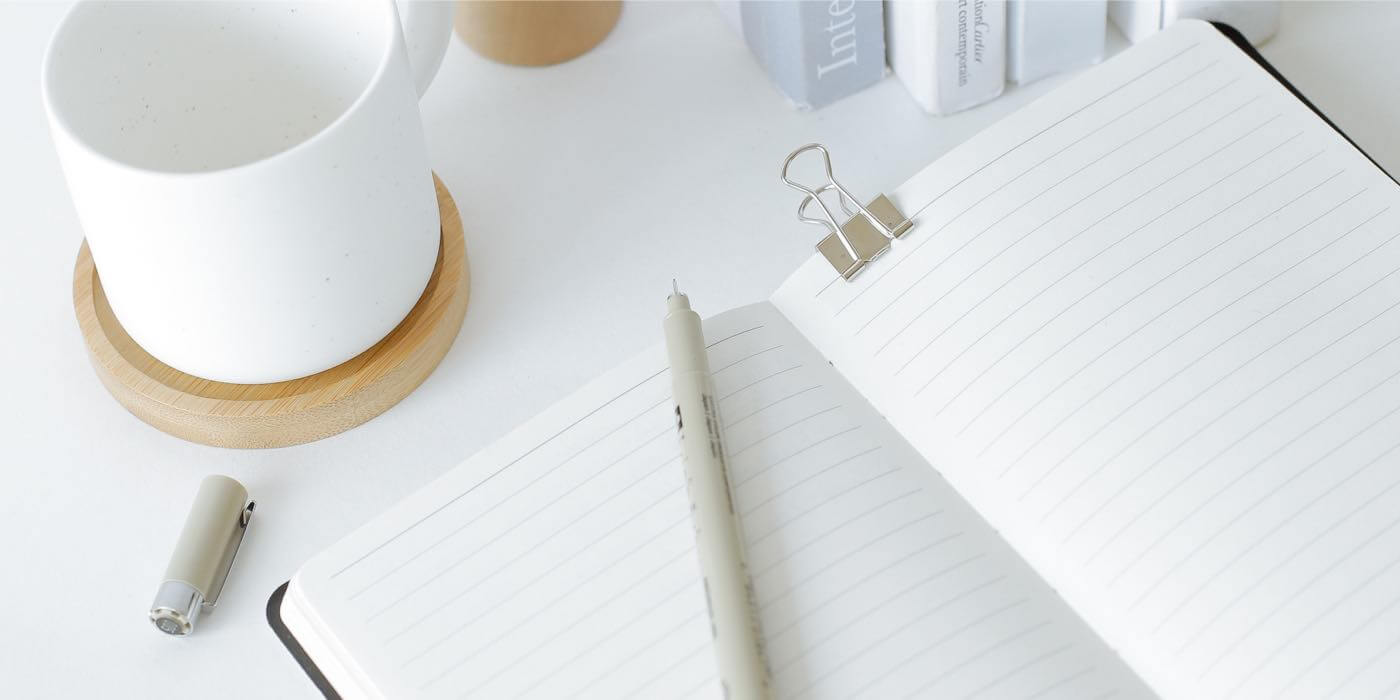As a psychologist, I get asked a lot about worry and how to stop worrying so much.
And every time, my answer is the same:
Never worry in your head.
Now, some people are initially a little offended because they think I’m being sarcastic…. Well, how else would I worry?!
But I’m actually being completely genuine.
See, most people assume that they have to worry in their heads. But in reality, there’s a much better way to worry. A way that reduces your anxiety and makes it less likely that you’ll end up worrying in the future.
You can worry on paper.
Refusing to worry in your head and writing your worries down on paper instead is an incredibly powerful way to break the habit of chronic worry and dramatically reduce your overall stress and anxiety levels.
Here are 4 psychological reasons why…
1. Worrying on paper creates space between your fears and your identity
One of the biggest causes of anxiety is that we over-identify with our thoughts and fears.
For example:
- The specific worry What if I sound like an amateur during the meeting? pops into your head.
- Which leads you to elaborate on that fear: My boss is going to be at the meeting… What if he thinks I’m no good?
- Which leads to a more intense elaboration on that worry: Why am I such a worrier? I wish I could just be confident in myself like Sam.
- Which leads to This is probably why I didn’t get that promotion last year…
- This leads to I’m such a fake and it’s only a matter of time before they realize it.
You started with a simple and specific worry (What if I sound like an amateur…), and through a series of very quick elaborations, ended up at a statement of profound self-condemnation and unworthiness (I’m such a fake).
A simple, mildly irrational worry—the kind many, many people experience on a daily basis—leads to an extremely irrational and negative belief about yourself as a person.
Psychologists call this cognitive fusion, which is when you conflate what you think with who you are. And it’s extremely harmful for your confidence, self-esteem, and eventually your performance and effectiveness.
Everybody has worries. But when you get in the habit of elaborating on your worries with more worries, that’s where severe anxiety and self-doubt arise.
Luckily, you can counteract this process by taking a moment to write your worries down instead of immediately elaborating them in your head.
For example:
- The specific worry What if I sound like an amateur during the meeting? pops into your head.
- You start to worry about the fact that your boss is going to be at the meeting but then…
- You catch yourself and PAUSE.
- You remember that trick you read about the other day to write your worries down.
- So reach into your desk drawer, pull out a bright pink sticky note, and write down What if I sound like an amateur during the meeting? on it.
- As you look at it, it somehow seems a little silly and not nearly as threatening or real.
- You crumple it up, throw it in the trash, and get back to polishing your presentation for the meeting.
- Finally, you go into the meeting a tad worried but nowhere close to the emotional wreck you might have been if you had gone all the way down the worry cycle and ended up at I’m such a fake and it’s only a matter of time before they realize it.
When you write down your worries, it’s easier to see them as separate phenomena distinct from you as a person. And seeing a worry literally spelled out on paper reinforces a crucial idea:
Worries are a part of you but they don’t define you.
In addition to getting in the habit of writing your worries down, here’s a helpful little mantra you can repeat to yourself to reinforce this idea:
I am not my thoughts.
2. Worrying on paper slows down your racing mind
You probably don’t appreciate just how fast a worrier you are…
In the span of just a few seconds to minutes you can have dozens of specific worries, each of which raises your anxiety and stress levels.
Here’s a little experiment to illustrate the speed of worry…
Set a stopwatch on your phone and read the following list of worries to yourself in your head:
- What’s that little pain in my left arm? Could it be a blood clot?
- Did she think I was insensitive for that comment I made about her sister?
- What if I don’t get enough sleep tonight? Tomorrow’s a big day…
- Why did he give me that dirty look? Did I do something stupid?
- I wonder if the meeting went well? I always ramble when I lead meetings…
It took me about 10 seconds to go through those 5 worries. This means I could easily worry at a rate of 30 worries per minute!
The reason the speed of worry matters is because worry is the engine of anxiety—each little worry produces a corresponding unity of anxiety.
So no matter how small each worry on its own seems, even if you only spend 30 seconds worrying, that’s 15 specific worries worth of anxiety you’ve introduced into the system.
Now imagine that, conservatively, you average 3 minutes per hour each day worrying… That’s 90 worries per hour and 1,440 worries per day! And each of those worries injects some amount of anxiety into your system.
That’s a lot of worry and anxiety!
This brings us back to why it’s so helpful to write your worries down on paper:
You can’t write nearly as fast as you can think.
Let’s do another experiment… Set a stopwatch and see how long it takes to write down those same 5 worries by hand on paper:
- What’s that little pain in my left arm? Could it be a blood clot?
- Did she think I was insensitive for that comment I made about her sister?
- What if I don’t get enough sleep tonight? Tomorrow’s a big day…
- Why did he give me that dirty look? Did I do something stupid?
- I wonder if the meeting went well? I always ramble when I lead meetings…
It took me one minute and fifty-two seconds to write down those five worries on paper. This means I worry on paper at a rate of approximately 2.7 worries per minute.
Now take a second to compare things…
- Worrying in my head: 30 worries per minute
- Worrying on paper: 2.7 worries per minute
If each of those worries is one unit of anxiety, think of how much anxiety you’re saving yourself by simply worrying on paper instead of in your head?!
The take-home message is simple:
You can drastically decrease your anxiety when you confine your speed of thinking to the speed of writing.
3. Worrying on paper short circuits the habit of overthinking
Overthinking means thinking when it’s not helpful. And it’s the source of a lot of emotional suffering and unhappiness.
Here are a few common examples of overthinking:
- Worry. When you’re in the habit of overthinking about possible threats, you end up feeling chronically anxious.
- Rumination. When you’re in the habit of overthinking about other people’s slights and wrongs against you, you end up feeling chronically angry.
- Self-criticism. When you’re in the habit of overthinking about your own faults, you end up with low self-esteem and even depression.
Unfortunately, because most of us have been practically trained since birth to be good thinkers, it’s a hard habit to set aside—even if we know it’s irrational and unhelpful.
And the reason is simple:
Habits get strengthened through repetition. And your overthinking habit is no exception.
Every time you have an initial worry, for example, and then follow it up with another worry, you’re effectively rewarding your brain’s decision to throw that initial worry at you. And as a result, strengthening the habit and making it more likely in the future.
But when you have a worry and then don’t immediately follow it up with another worry, you’re withholding reward and breaking the cycle—and along with it, the habit.
Writing down your worries is helpful because it short-circuits the habit formation cycle that keeps worry going.
When you get in the habit of having an initial worry then pausing, pulling out a piece of paper, and slowly writing it down, you’re weakening the habit of worrying in response to worry.
Remember:
The less of a habit worry becomes, the calmer and less anxious you’re going to feel.
4. Worrying on paper makes you an author, not a victim
Most people with chronic worry and anxiety believe that worry happens to them.
Like a character in a story, they see worries as a series of unfortunate events that befall them and cause them to be anxious and stressed out.
Now there is a grain of truth to this: Sometimes worries do spontaneously pop up in our minds. But these spontaneous worries make up only a small fraction of our overall worry load.
In reality, the vast majority of our worries are things we do—sometimes deliberately, but usually habitually. But in either case, it’s crucial to remember:
Sometimes worry just happens, but most of the time it’s something we do.
This means that you’re not just the character in your life’s story, but you’re also the author—capable of taking control of the narrative and changing how the story ends.
Even if you can’t control when an initial worry pops into mind, you can control how you respond to it—specifically, whether you continue to elaborate and extend your worries or not.
And this is exactly what happens when you catch yourself worrying and decide to write down those worries instead:
Writing your worries down helps you shift your perspective from a passive character to an active author.
And as the author of your life, you can choose to elaborate on a worry or not—just like an author can choose for their character to think one thought or another.
The confidence that comes from this authorial belief is HUGE when it comes to counteracting worry and anxiety.
If you want to control your worries, start writing them down.
All You Need to Know
Sometimes worries happen to us. But most of the time, worries are something we do. And when we do them enough, we get in the habit of worrying which leads to chronic stress and anxiety.
If you want to break this worry habit, stop worrying in your head and start worrying on paper.
This is helpful for a few reasons:
- Worrying on paper creates space between your fears and your identity
- Worrying on paper slows down your racing mind
- Worrying on paper short circuits the habit of overthinking
- Worrying on paper makes you an author, not a victim





8 Comments
Add YoursThis is a masterpiece. I needed it badly. I’ve entered tons of anxiety in my system. I hope that I can reverse it by this technique. From now, I WILL WORRY ON PAPER.
Hi, Nick! I’m Vinicius from Brazil.
Your articles are helping me a lot.
Thank you very much!
Thank you Nick, very thoughtful and well written.
Fabio from Italy
I have gotten a new trick of downloading all garbage s of all anxieties out of my brain
I loved it and I’m going to start writing worries down. It certainly can’t hurt right?
Thank you very much Nick. In the day to day and as the years go by, the decades. One simply ignores these mechanisms, what you teach is revealing, very useful. Thank you very much ! Greetings from Patagonia Argentina. Leo
I write my agitations on toilet paper. There’s a definite satisfaction of seeing & hearing them go away instantly & permanently.
I actually don’t trust anyone enough anymore (Dr’s, Family, Friends, or Partner’s) because of everything that has led me up to now. So I decided to start writing everyday, even if it’s only 1 thought, feeling, or just what you zte that day, I learned that I could trust myself which I only allow myself to read my story and it has honestly helped me cope with a lot of my past and everyday life. I would strongly recommend to at least try and see how it works for yourself!
**** HAPPY THOUGHTS ON PAPER****